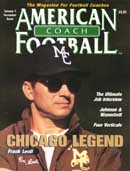Article CategoriesAFM Magazine
|
The Ultimate Interviewby: Dr. John LauriePrincipal, Shawnee Mission West High School, Shawnee Mission, Kan. © More from this issue An over-time approach to getting the right candidate for the head coach position. I offer it to you from the position of a principal at a high school in suburban Kansas City. But an athletic director or a coach anywhere wanting to fill a coaching vacancy when it is very difficult to distinguish between two candidates could use the same procedure/philosophy. The Selection Process Over 30 applicants were "paper-screened" for the position. Our selection committee reviewed resumes/credentials, letters of support, ....The full article can only be seen by subscribers.
|
|
|||||||
| HOME |
MAGAZINE |
SUBSCRIBE | ONLINE COLUMNISTS | COACHING VIDEOS |
Copyright 2026, AmericanFootballMonthly.com
All Rights Reserved





